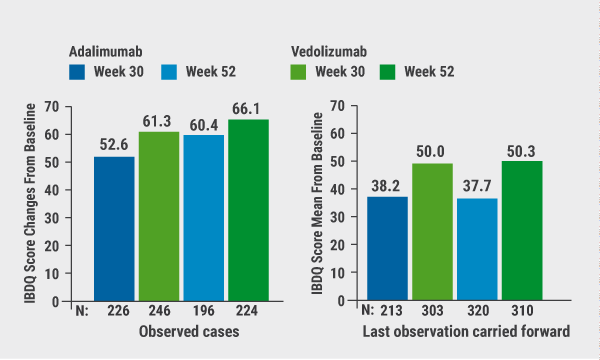In UC, TNFα-like ligand 1A (TL1A), is upregulated at the site of active disease. PF-06480605 is a first-in-class fully human IgG1 monoclonal antibody targeting TL1A. In TUSCANY, participants received 7 doses of 500 mg intravenous PF-06480605 every 2 weeks and were then followed up for 14 weeks. Of the 50 participants who received PF-06480605, 42 completed the study.
At week 14, statistically significant endoscopic improvement (Mayo endoscopic subscore ≤1 without friability) was observed in 38.2% of participants; 24% achieved remission (total Mayo score ≤2, with no individual subscore >1) and 10% endoscopic remission (Mayo endoscopic subscore 0). In participants with endoscopic improvement, normalisation towards a non-inflamed transcriptome was demonstrated.
There were 109 treatment-emergent adverse events (AEs), 18 of which were deemed related to treatment. Aside from worsening UC, the most common treatment-emergent AE was arthralgia, which occurred in 6 participants, and was thought to be treatment-related in 1. Four treatment-emergent serious AEs were reported in 3 participants, 1 of which (alopecia) was thought to be treatment-related. There were no malignancies or deaths.
- Danese S, et al. ECCO-IBD 2020, DOP72.
Posted on
Previous Article
« Open-label extension study of risankizumab: final results Next Article
AMT-101: an oral human IL-10 fusion protein »
« Open-label extension study of risankizumab: final results Next Article
AMT-101: an oral human IL-10 fusion protein »
Table of Contents: ECCO 2020
Featured articles
Gut Microbiome as Treatment Target
Response to faecal microbiota transplantation in UC
Bioactives produced by gut bacteria to modulate immune response
Big Data Analysis
Multi-omics help describe CD phenotypes
The positive impact of genetic data on drug development
Experimental Therapies: Study Results
AMT-101: an oral human IL-10 fusion protein
Phase 2 results of first-in-class TL1A inhibitor
Open-label extension study of risankizumab: final results
Clinical remission after dose escalation of upadacitinib
Short- and Long-Term Treatment Results
Infliximab discontinuation increases relapse risk
Tofacitinib ‘real-world’ effectiveness in active UC
Subcutaneous ustekinumab as maintenance therapy in UC
Subcutaneous vedolizumab maintenance therapy in CD
Vedolizumab treatment persistence and safety
Specific Therapeutic Strategies
Impact of strategies on intestinal resection rate
Early ileocaecal resection in CD patients failing conventional treatment
Biologics before surgery in IBD do not elevate infection risk
Top-down infliximab superior to step-up in children with CD
High versus standard adalimumab in active UC
Head-to-Head Comparison of Treatments
Vedolizumab and anti-TNF therapies: a real-world comparison
Cancer Risk
Increased risk of small bowel cancer in IBD
Increased incidence of colorectal cancer and death in CD
Risk of rectal, anal cancer increased in perianal CD
Glyco-fingerprint as risk factor of UC-associated cancer
Miscellaneous Topics
Resolution of mucosal inflammation has dramatic effect
PICaSSO validated in real-life study
Re-inducing inflammation in organoids from UC patients
Role of immune cells in intestinal fibrosis
Association between meat consumption and IBD risk
CD exclusion diet corrects dysbiosis
Related Articles

April 14, 2020
Effects of vedolizumab versus adalimumab on QoL
April 14, 2020
Vedolizumab treatment persistence and safety

April 14, 2020
Impact of strategies on intestinal resection rate
© 2024 Medicom Medical Publishers. All rights reserved. Terms and Conditions | Privacy Policy
HEAD OFFICE
Laarderhoogtweg 25
1101 EB Amsterdam
The Netherlands
T: +31 85 4012 560
E: publishers@medicom-publishers.com

